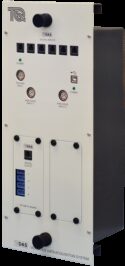Experiment
AF300

SUPERSONIC WIND TUNNEL (INTERMITTENT)
An intermittent supersonic (up to Mach 1.8) wind tunnel for investigations into subsonic and supersonic air flow around two dimensional models. Also for analysis of the profile of the tunnel
working section.
If you have any questions or you'd like to discuss a product, please call us.
+44 1159 722 611SUPERSONIC WIND TUNNEL (INTERMITTENT)
An intermittent operation, induction-type supersonic wind tunnel for investigations into subsonic and supersonic flow. This includes tests on the flow around two-dimensional models at subsonic and supersonic air speeds.
A compressed air supply (AF300b, available separately) induces a flow in the working section of the wind tunnel. This gives a less turbulent and more stable flow for accurate results and comparison with theory. The essential compressed air supply includes filters and air dryers to give the dust-free and dry air source needed for good results.
Students use a delivery valve to allow compressed air to enter the wind tunnel. The wind tunnel includes two analogue pressure gauges. One measures the compressed air pressure available from the supply (for reference); the other measures the pressure delivered to the wind tunnel and includes an electronic transducer that connects to TecQuipment’s optional Versatile Data Acquisition System (VDAS®) to record the pressure.
The working section of the wind tunnel is a convergent-divergent nozzle with a removable top part (‘liner’). The shape of the liner controls the maximum air velocity at the divergent part of the working section. Included are three different liners.
High optical-quality glass windows (‘portals’) are at each side of the divergent part of the working section. The portals allow students to use the optional Schlieren Apparatus (AF300a, available separately). This allows display and recording of images of pressure waves around two-dimensional models.
Included is a set of two-dimensional models. These mount between the portals inside the working section. Students can adjust the angle of the models. An encoder electronically measures the model angle.
Spaced at precise intervals along the working section of the wind tunnel are pressure tappings. Two extra tappings connect to one of the models when in use. A 32-way pressure display (included) connects to all the pressure tappings. It displays the pressures and transmits them to VDAS® for instant recording and calculations of pressure ratios and Mach numbers.
Included is a bench-mounting instrument frame that holds and provides power for the electronic instruments and the VDAS® interface unit. The instrument frame connects to a suitable electrical supply.
VDAS® allows accurate real-time data capture, monitoring, display, calculation and charting of all the important readings on a suitable computer (computer not included).
Learning outcomes
- Pressure distribution along a convergent/ divergent (Laval) nozzle with subsonic and supersonic air flow.
- Comparison of theoretical and actual pressure distributions.
- Comparison of actual and theoretical area ratios of a nozzle at supersonic air velocities (Mach numbers).
- Pressures around a two-dimensional model in subsonic and supersonic flow conditions, at different angles of incidence.
- Lift coefficients for aerodynamic models in supersonic flow.
- Shock waves and expansion patterns around a two-dimensional model in supersonic flow conditions (when used with the optional Schlieren Apparatus).









